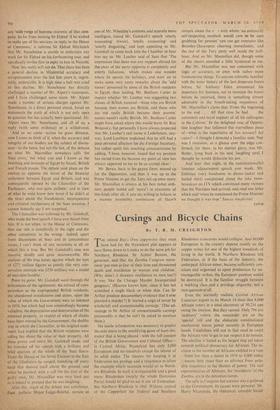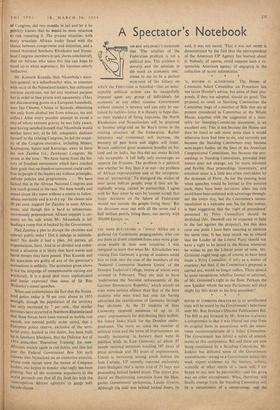Cursings and Bicycle Chains
It y . R. NI.
CREIGHTON Mitt: retired Boy's Own copywriter they must 1. have had for the Nyasaland plot appears to have flown down to Lusaka to do the same job for Northern Rhodesia. Sir Arthur Benson, the governor, said that the Zambia Congress move- ment 'put men in fear of their lives and threatened death and mutilation to women and children.' (Why didn't it threaten mutilation to men too?) It was 'like the Chicago Murder Incorporated gangsters.' (Heaven knows how, since it has not scratched a single black or white skin. Can Sir Arthur produce documentary evidence that it ever planned a Murder?) It 'started a reign of terror by witchcraft and unmentionable cursings.' (The ad- vantage to Sir Arthur of unmentionable cursings presumably is that he can't be asked to mention them.)
No inside information was necessary to predict the next move in the unedifying game of hunt-the7 traitor that is being played—with the full consent of the British Government and Colonial Office— in Central Africa. Nyasaland has only 8,000 Europeans and no resources except the labour of its adult males. The reasons for keeping it in Federation are prestige and a 'reluctance to allow the example which- secession would set to North- ern Rhodesia. In itself it is expendable and a good many Rhodesians (nearly the whole Dominion Party) .Would be glad to see it out of Federation. But NOrthern Rhodesia is vital. Without control of the Copperbelt the Federal and Southern
Rhodesian economies would collapse. And 80,000 Europeans in the country depend mainly on the copper mines for one of the highest standards of living in the world. If Northern Rhodesia left Federation,. or if the basis of the industry, the underpaid African miner, became sufficiently con- scious and organised to upset production by un- manageable strikes, the European position would be destroyed. It is the familiar struggle between a working class ,and a privilege oligarchy, not a race question at all.
Even the normally realistic Central African Examiner argues in its March 14 issue that 8,000 African voters in a total electorate of 30,234 can swing the election. But they cannot. Only 796 are 'ordinary' voters; the remainder arc on the 'special' roll and the elaborate constitutional mechanism leaves power securely in European hands. Candidates will not in fact need to court the African vote to get in nor respect it to remain. The election is hailed as the largest step yet taken towards political democracy for Africans. The in- crease in the number of Africans entitled to a vote —from less than a dozen in 1954 to 8,000 today —means little more than an advance from palp- able impotence to the illusion of power. The real representatives of Africans, the 'murderers' of the Zambia, are in the detention camps.
The split in Congress last autumn was a godsend to the Government. Its causes were personal. Mr. Harry Nkurnbula, the rhetorical, unstable leader
Di Congress, did two months in jail and let it be publicly known that he would be most reluctant to risk repeating it. The present situation, with every articulate African leader faced with the choice between compromise and detention, and a round thousand Southern Rhodesian and Nyasa- land Congress members in jail, shows conclusively that no African who takes this line can hope to stand up to white supremacy. He becomes utterly inefiective.
Mr. Kenneth Kaunda, then Nkurnbula's secre- tary-general, is a schoolteacher who, in common with most of the Nyasaland leaders, has cultivated extreme asceticism, not for any mystical purpose but in order to face prison with equanimity. (They are disconcerting guests in a European household, men like Chiume, Chisiza or Kaunda, abstaining not only from alcohol but from tobacco, tea and coffee.) After every possible attempt to avoid a step of whose extreme gravity he was fully aware, and having satisfied himself that Nkumbula would neither leave nor, as he felt, adequately dedicate himself to the existing Congress, he led the major- ity of the Congress executive, including Messrs. Kapwepwe, Sipalo and Kamanga, away to form his new Zambia (i.e., Zarribesia) Congress. He wrote at the time: 'We have learnt from the his- tory of freedom movements which have reached their goals that no freedom movement could really free its people if the leaders are without principles, definite policies and programmes. . . . We have Jacked this in the African National Congress and lost much ground in the race. We were woolly and oozed about like water without a course to follow, whose inevitable end is to dry up.' He claims now 80 per cent. support for Zambia in most African areas, and though this is hard to substantiate, enormously preponderant African support is cer- tainly on his side while Mr. Nkumbula is left leading a rump that is backed by the Government.
Had Zambia a plot to disrupt the elections and subvert public order? Did it indulge in intimida- tion? No doubt it had a plan. All parties, all organisations, have. And in so divided and embit- tered a situation it is likely that hard words and harsh threats may have passed. That Kaunda and his associates are guilty of any of the governor's accusations is unlikely. The quotation given above is not the language of unmentionable cursing and Witchcraft. It is a good deal more sophisticated and better expressed than some of Sir Roy Welensky's recent speeches.
When one contemplates the fact that the Nyasa- land police today is 70 per cent, above its 1951 strength, though the population of the territory has only increased by 7 per cent., that similar increases have occurred in Northern Rhodesia (and that these forces have been trained as mobile riot Squads, not normal public order units), that a European police reserve, exclusive of the terri- torial army, trained in riot duties, has been built up in Southern Rhodesia, that the Defence Act of 1954 prescribes Peacetime Training' for non- Africans, mainly again in riot duties, and that last Year the Federal Government flew 500 such trainees into Nyasaland on an expensive exercise, Whose code names were the names of Congress leaders, one begins to wonder who really has been Plotting, Not all the economic arguments in the World persuade one that all the fault lies with the unscrupulous African agitators' or gangs with bicycle chains.



































 Previous page
Previous page